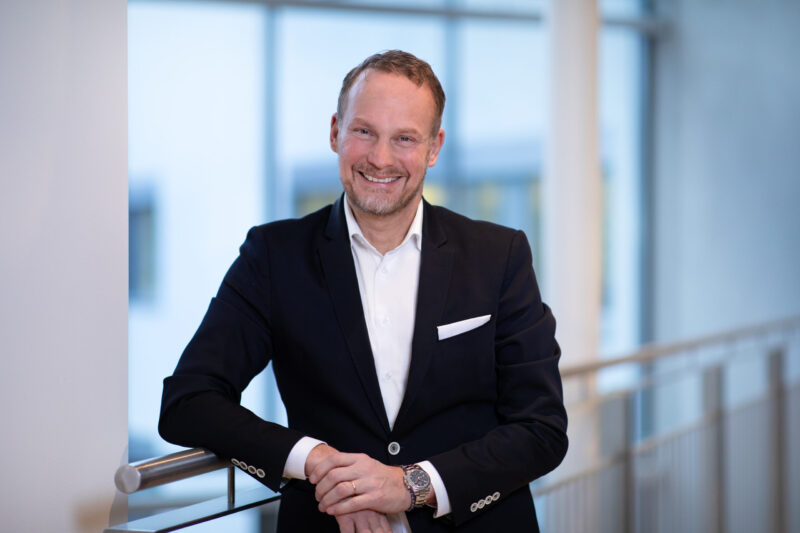The agile leadership simulation game taught Neova to play as a team – “The team understood why the change had to be made”
Business upheavals also require a fundamental change from the company’s IT. With Sofigate’s help, Neova’s information management team, which is strongly reforming its business, was able to use a simulation game to practice its new operating model based on the business technology model. Neova’s CIO, Jukka Holm, is satisfied with the results: “Neova now has business-oriented information management that knows how to work as a team.”
The group’s information management is assembled, but the atmosphere is disconcertingly reminiscent of an elementary school afternoon club. Shouting from one table to another, sprints from here to there, raucous laughter. They are trying to revolutionise their working methods in one day, though the group is now shooting the breeze and sticking paper notes on the wall, even though time is already running thin. The clock is ticking and the pace is picking up. There is excitement and hustle and bustle in the air. Will they succeed?
Business and it play together
Neova’s simulation game with Sofigate Academy is underway, where the lessons of the two-year training program are put into practice by imitating the company’s operations. The purpose is to find development bottlenecks and solutions for them.
A fundamental change is at the heart of everything. Previously known as Vapo, Neova has quickly shifted the focus of its business from fuels to growth mediums and peat-based products for water and air purification.
In addition to the change in business direction, the role of IT at Neova was also altered drastically. Sofigate helped Neova build an ICT 3D operating model (Demand, Development, Delivery model) for information management, which closely supports the business.
At the same time, Neova’s business and information management had to learn to understand each other better, so that the team cooperation would produce better results. Neova’s information management team was trained in the new operating model in a two-year change program.
“Thanks to the training program, Neova now has business-oriented information management that knows how to work as a team,” says Jukka Holm, Neova’s CIO.
You learn best through trial and error
The simulation game was part of the program finale that pulled all the learning together.
“In the training program, we learned new things not only as individuals and as a unit, but also as a company. In the simulation, we practiced the implementation of the process as if it were a miniature model – it was the culminating cherry on the cake of the program,” Holm describes.
In the simulation game, a company consisting of several teams is formed, which tries to maximize its financial result and value generation. The game is played in three rounds.
“The first round was a terrible mess, where mistakes were made all over the place. The participants were put in tasks that they don’t usually do, which felt uncomfortable but forced them to look at the activity from a new perspective. For example, teams supposed they were not allowed to talk to other teams, they worked in silos, and tried to exchange information by sending notes, even though all the teams were sitting in the same room,” says Holm.
“After the round, the lights switched on when the players realized what they should have done. The second round went better, and in the third they already knew how to stretch the rules. In the end, the careful tester, who became immersed in the game as a representative of the business, wanted to skip the testing because it was necessary to get to production faster,” Holm laughs.
Perspective, speed and laughter
“The game taught cooperation: understanding other perspectives, communication and interaction. Other insights were related to speed and prioritization. It became clear that endlessly refining the product will not work because the potential benefits are lost before it has been put into production. Less important parts of the process can be left out and still reach the best possible result.”
Due to the corona pandemic, one of the goals of the game day was team building. Many new people from Neova had started working remotely during the pandemic, and being together in the same room was new.
“Smooth teamwork requires practice and getting to know each other. Our group was really excited about the simulation and it was fun being together. The game day showed that a team that achieves top performance does not have to work excessively. Almost everyone gave the day full marks,” says Holm.
“The simulation game is an effective way to learn what kind of change is needed and why because you learn by doing and experimenting. In the game, it is safe to learn from mistakes the hard way. It leaves a stronger memory imprint than a barrage of PowerPoint slides,” says Liisa Korkiakoski, CTO of Sofigate Business Technology Academy.
“According to a scientific meta-analysis, simulations increase self-confidence in applying what has been learned by 30 percent more than classroom or virtual teaching.”
For changing organizations and managers who need a comprehensive picture
In Holm’s opinion, the simulation game is well suited for organizations on the brink of a big change.
“With the help of simulation, people understand why the change needs to be made. Also, if cooperation between business and IT isn’t smooth, these aspects can be practiced under the guise of play. The dynamics of the group open up better when we are in the same room.”
Holm reckons that the simulation game is also be useful for managers who, thanks to the game, better understand the whole they are leading.
“The simulation game is an absolutely exceptional product, the value of which is difficult to understand before you experience it yourself. The people of Sofigate implemented a program that really matched the Neova identity,” Holm concluded.


